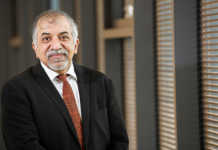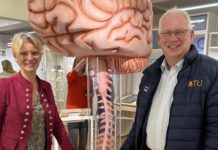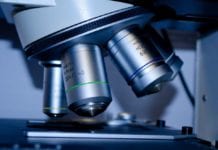A new therapy pioneered by a medical company in Galway may help to slow the kidney damage from Type 2 diabetes.
University of Galway, in collaboration with the EU Horizon 2020-funded NEPHSTROM Consortium, has announced promising results from a clinical trial for a new treatment for Type 2 diabetes.
The NEPHSTROM clinical trial is taking the first steps to investigate the value of a novel cell therapy for adults who have type 2 diabetes and worsening kidney disease, despite best medical treatment.
The ORBCEL-M cell therapy is a mesenchymal stromal cell (MSC) preparation manufactured from healthy bone marrow.
The therapy was discovered and developed in Galway by Orbsen Therapeutics Ltd, a spinout company from University of Galway.
The clinical trial is being led from the Mario Negri Institute for Pharmacological Research IRCCS in Bergamo, Italy and carried out jointly at leading medical centres in Galway, Bergamo, Birmingham and Belfast.
Dr Steve Elliman, who discovered the ORBCEL-M therapy, is Chief Scientific Officer for Orbsen Therapeutics, outlined it potential benefits over current treatments.
“Diabetic patients with progressive kidney disease eventually require dialysis and often a kidney transplant.”
“While dialysis improves the quality of life of patients with kidney failure, it is expensive and does not prevent further decline of kidney function.”
“Additionally, dialysis takes four hours per session and three times a week – creating logistic and economic challenges for the patient.”
The goal of this therapy is to reduce inflammation and improve kidney function, so that neither dialysis or an organ transplant it required.
“We’re encouraged by the safety profile and the preliminary efficacy signals in patients with DKD reported by the NEPHSTROM trial,” Dr Elliman said.
Trial investigator, Professor Matt Griffin, is a senior researcher at University of Galway’s Regenerative Medicine Institute (REMEDI), and a Consultant Nephrologist at Galway University Hospitals.
He said, “Nearly a quarter of a million people in Ireland are living with diabetes and we know that more than 40% of them have evidence of kidney disease – often referred to as diabetic kidney disease or DKD for short.”
“In type 2 diabetes, as many as one third of those with DKD have worsening kidney function despite the best medical therapy we can offer.”
“These people are at high risk for requiring dialysis or kidney transplantation in the years ahead – both of which are complex treatments with potentially serious complications.”
“In NEPHSTROM, our goal is to secure evidence that a cell therapy, such as ORBCEL-M, is safe and can slow the course of DKD to help more people with diabetes avoid the need for dialysis or transplantation.”
He said that it was exciting to see that the first results from this clinical trial support the goal they’re working towards.









